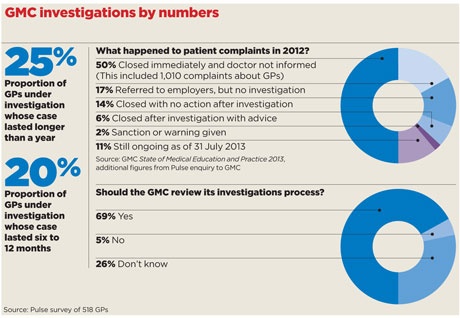The stress of a GMC investigation is probably one of the worst things that can happen in a GP’s career. Justifying your actions, defending your decisions, then waiting weeks or months to see if the regulator concurs is inevitably an exhausting process.
But what if the GMC was keeping other complaints on file about you – complaints you had never been informed about and never had the chance to defend yourself against?
Pulse has learned that each year the GMC is storing hundreds of secret complaints about GPs. These complaints are judged to be low-level and are therefore not acted on – but they are filed away for possible use in the event of a future investigation.
The GPs involved are never informed of the complaints, or that such information is held by the GMC. Indeed, only four doctors have ever exercised their right to ask the GMC about the files under the Data Protection Act.
The revelation comes amid mounting concern about the regulator’s oversight of GPs, with record levels of complaints and two-thirds of GPs saying the GMC should review and overhaul its investigations procedure.
‘Closed complaints’
Figures obtained by Pulse from the GMC show that in 2012 there were just over 1,000 ‘closed complaints’ made, involving 655 different GPs. The doctors involved were never informed, unless they asked, that the complaints have been made.
The complaints are those the GMC has decided do not affect fitness to practise. But crucially, the records are kept on file in case they may be relevant to a future investigation against the GP.
Medical defence bodies have called for these complaints to be deleted after four years.
But the GMC says it is in the ‘public interest’ that this information is kept on GPs. An internal review of its policy on retention of records, which took place in December 2012, concluded: ‘We are satisfied that there is no breach of the data protection requirements in not disclosing closed complaints as a matter of routine.’
The regulator is looking at developing a ‘summary record’ of complaints that will be kept indefinitely, while other information is destroyed.
The GMC says the policy of keeping closed complaints on record without informing doctors was first implemented in 2004, but refuses to disclose the total number of closed complaints it holds on file or say how many times they have been called upon in subsequent investigations. It says it will only consider disclosing this information if it is subject to a request under the Freedom of Information Act.
GP leaders and medical defence bodies are appalled by the lack of transparency over the so-called closed complaints.
Dr John Canning, chair of the BMA’s professional fees committee, says: ‘There have to be very unusual circumstances where there is information held about you that you are not aware of. There should be a principle of nothing being held about you unless you know about it.’
Dr Nick Clements, head of medical services at the Medical Protection Society, says the information can be sought under the Data Protection Act for a fee of £10 (see box, page 22). But only four doctors have ever exercised this right. The GMC is under no obligation to inform GPs of their right to apply for this information – or indeed disclose that the information is held.
‘In an ideal world, if a complaint is completely trivial, one would hope it is deleted,’ says Dr Clements.

Growing burden
The problem of hidden complaints is also likely to worsen given the huge increase in the number of complaints made over the past seven years.
There were 8,109 and 8,781 complaints about doctors received by the GMC in 2012 and 2011 respectively; this compares with 7,153 in 2010, which itself was a record figure.
For almost 90% of these complaints – both known and unknown – there will be no sanction at the end of the process.
But the process itself takes a toll. A Pulse survey of 518 GPs shows around one in five (18%) has been the subject of a GMC investigation at some point in their career. All but 13 were cleared without facing any further action.
Although the overwhelming majority of claims turn out to be baseless, the investigation process is often lengthy. A quarter (25%) of the GPs investigated said their case took more than a year to resolve, while a further 20% said it took between six months and a year.
This can lead to significant repercussions. The Pulse survey found 17% of GPs who were investigated had to seek counselling, while 12% took time off work.
A GP from Glasgow who had a complaint about a refusal to give a patient a smear test told Pulse: ‘I got a letter from the GMC, which gave me a shock. It said it had received a complaint and had to investigate it. I had to provide the name of my ‘medical director’, which I did not really know, so they could check whether I had been subject to other complaints.
‘The GMC wrote to me and said: “We do not think there is a need for the GMC to be involved”, but added: “If you do not hear from us again, you can assume things are ok”.
‘For several months afterwards, every time I got the post I was hoping there was nothing from the GMC.’
The problem is serious enough for the BMA to have set up its own investigation into the impact of patient complaints on doctors, surveying almost all of its members by email on their experience of complaints made to the GMC, managers or others.
And in September last year, the GMC launched an internal review of cases where doctors have committed suicide while under a fitness-to-practise investigation, in an effort to see if it can do more to support vulnerable doctors. This came after it emerged that since 2004 at least 96 doctors have died while facing investigation, although it is not clear how many of these cases involved suicide. The GMC says its review is ‘ongoing’, with its findings to be published in ‘due course’.
In Pulse’s survey almost half (42%) of the GPs who had undergone an investigation said they were unhappy with the GMC’s handling of the complaint, compared with 26% who said it was fair. But the most striking finding was that 69% of GPs – including those who have never faced an investigation – want the GMC to review and look to improve its investigations process.
Dr Clements says the time taken to list cases once a GP has been referred to a panel has been shortened, although he adds that when it comes to the time between a complaint being received and a decision being made on whether to progress to a fitness-to-practise hearing, ‘we probably haven’t seen a significant change’.
Trivial complaints
Much of the criticism surrounds the GMC’s focus on what many see as trivial matters. Dr Canning says: ‘The GMC should be focusing on serious misconduct and professional performance which is significantly below standard, and managing those whose performance is affected by health in a sensitive way.’
The GMC claims it deals with 92% of complaints within 12 months and has made moves to further speed up the process. Last May it implemented several changes to the fitness-to-practise process, including removing the need to read out allegations at the start of a hearing, improving arrangements for witnesses to submit evidence by video or telephone and ensuring witnesses are told in advance if they need to give evidence in person.
GMC chief executive Niall Dickson denies that the regulator is complacent. He says: ‘We are looking at what more we can do to make our investigations less stressful for both doctors and complainants. A number of the reforms we want to make will require legislation.’
He adds: ‘We are also meeting with doctors at the end of an investigation to improve how we handle fitness-to-practise cases, better share information and in some cases resolve concerns without the need for a hearing.’
How to get information on secret complaints about you
You can apply to find out what complaints have been made against you through the Data Protection Act. You must submit a ‘subject access request’ to foi@gmc-uk.org, asking for information on any complaints about you that the GMC has ‘closed’ without informing you.
The GMC can also be contacted on 01619236365. The fee is £10, and you will be given details on how to pay this when they acknowledge the request. They have 40 calendar days to respond once they have received payment.

















